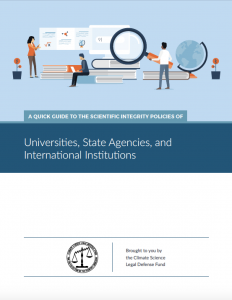May 18, 2020
Guest Post: A New Resource on What Researchers Need to Know About Scientific Integrity
Posted by Caitlin Bergstrom
The Climate Science Legal Defense Fund (CSLDF) has a new resource for scientists: A Quick Guide to the Scientific Integrity Policies of Universities, State Agencies and International Institutions.
Published in April, the free guide describes how these entities typically structure their scientific integrity policies, highlights areas in which there are notable differences, provides tips for researchers trying to navigate these policies and notes the areas where the policies need improvement.
This information will help scientists understand how the institutions they work for approach scientific integrity and what they should do if they feel their work or the work of their institution is compromised.
Institutions must have effective, comprehensive policies that govern scientific integrity. Such policies can ensure openness and transparency in research, protect science and scientists from political interference and facilitate public trust in science and policy decisions.
These are among the reasons why researchers should consider familiarity with scientific integrity guidelines to be a crucial part of their professional development. Given the ongoing attacks on science in the United States, understanding how to protect the integrity of the scientific endeavor is more important than ever.
When putting together this guide, the CSLDF found that most universities and a few state agencies have policies that govern the conduct of their research. But many of these policies do not include fundamental topics such as prohibiting retaliation against those who report misconduct or preventing political manipulation of scientific results.
Instead, the policies primarily focus on narrow concepts such as plagiarism and data fraud. While these topics are important, limiting scientific integrity policies to these issues does not reflect the range of threats that scientists face when trying to conduct their research.
In contrast, the scientific integrity policies of U.S. government agencies often include issues like political interference or public communication. Scientists working for or funded by the federal government will find agency-specific information in the guides to scientific integrity at nine federal agencies, which CSLDF published in March.
University and state policies must include broader concepts of scientific integrity, and those policies of federal agencies could be stronger as well. Protecting science against political interference is a critical first step in ensuring that the research conducted by all institutions is credible and reliable.
CSLDF’s guides are not a substitute for legal advice, but their attorneys provide free, confidential consultations to scientists from any discipline with questions about scientific integrity. Write to [email protected] to request a meeting.
— The Climate Science Legal Defense Fund is a nonprofit that protects the scientific endeavor by putting its legal expertise to work for scientists who are threatened or silenced for doing their jobs.


